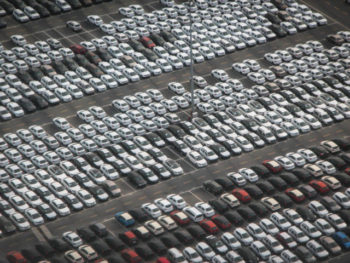Switch to WLTP helps European new car market hit nine-year high
The European new car market continued its strong performance in July as registrations reached their highest monthly volume since July 2009.

A total of 1.31 million cars were registered in July, a year on year increase of 10.0%
Figures from Jato Dynamics show a total of 1.31 million cars were registered in July, a year on year increase of 10.0%.
The market was boosted by increased demand in Spain and France, as well as double-digit growth in midsize markets like the Netherlands, Austria and Poland. The results were also boosted by an extra selling day in the month compared to July 2017.
However, Jato said that the upcoming deadline to register cars under the existing NEDC emissions regulations may also have had an impact by accelerating the purchase process.
DfT derogation rules mean carmakers can only sell up to 2,000 (or 10% of 2017’s sales volume) pre-1 June build vehicles after September when the new Worldwide harmonized Light Vehicles Test Procedure (WLTP) cycle finally kicks in for all new cars. In turn, it’s raised concerns that large numbers of in-stock cars might do not meet the new regulations, with potential to increase pre-registrations and bumper discounts as they are pushed through to market.
“The results from July are certainly positive and a clear sign that the market is recovering well, despite the current challenges it faces over diesel and CO2 regulations. Although these results are encouraging, part of the growth could potentially be explained by more consumers and dealers buying cars before the WLTP test process is extended to cover all new car registrations on 1st September. It will be interesting to see how the market performs in August, and whether this confirms the theory,” said Felipe Munoz, JATO’s global analyst.
Jato also said that continued growth in SUV demand helped drive growth, with their volume up by 34% to 461,900 units. This means they accounted for 35.3% of total registrations across Europe for the month – a new record.
Small SUVs played a key role in the growth of the SUV sector and accounted for 37% of total SUV registrations. Volume for small SUVs in July increased by 50%, rising from 113,400 units in July 2017 to 169,800 units last month. With the exceptions of Suzuki, Mazda and Mahindra, all car groups posted an increase in the small SUV sub-segment. Renault-Nissan secured a 25% share of the market, followed by PSA and VW Group which accounted for 23% and 19% of the market respectively.
However, SUV market continued to be dominated by compact SUVs, which recorded 198,300 registrations, a volume increase of 34%. VW Group led the sub-segment with a 22% market share, followed by Renault-Nissan with 17% and Hyundai-Kia with 13%. VW Group also led in the midsize SUV sub-segment, whose registrations totalled 73,000 units, up by 15%.
Only large SUVs didn’t grow, with volume stable at 20,900 units. Meanwhile, demand for subcompacts, compacts and city-cars also grew but at a slower pace than the overall market. Outside of the SUV market, all segments lost market share.
Amongst the carmaker league table, VW Group was once again the top-selling car maker in Europe in July and it also posted the highest market share gain. This was largely due to its latest SUV launches being a success with consumers, as the T-Roc hit the top 25 model ranking, and the Karoq and Arona also gained significant market share. The results can also be attributed to double-digit growth across the VW, Skoda and Seat brands.
Renault-Nissan also performed well in July, with registrations up by 14% to 193,100 units. With the exception of Infiniti, all of its brands recorded increases. PSA was slightly ahead with 6,100 more registrations, but its volume was only up 6% as increases at Peugeot, Citroën and DS were offset by a 3% decline at Opel/Vauxhall.
Other brands which recorded significant increases during the month included Suzuki, Jeep, Mitsubishi, Smart, Alfa Romeo, Porsche, Jaguar and Subaru. Conversely, Mazda, Mini, Land Rover, and Mercedes all posted declines.
The Volkswagen Golf maintained its place as the best-selling car in Europe, as did the Volkswagen Tiguan as the best-selling SUV.







